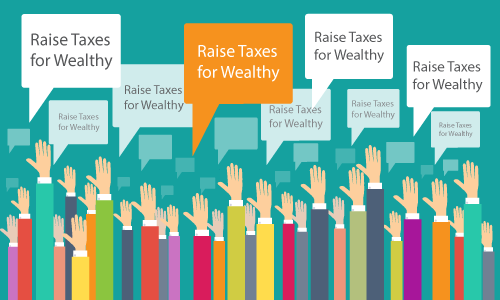Voters in Multiple States Choose Higher Taxes for the Wealthy

Of course, the big news from the election earlier this month was that Donald Trump shocked the world and defeated Hillary Clinton in the race to become the 45th president of the United States. However, there were several other important national, as well as local, election races and issues that were decided on November 8th. Not the least of which were several state measures aimed at raising taxes on high net worth individuals.
To that end, voters in both California and Maine decided that the rich needed to pay more taxes. In Maine, the vote to raise the state’s top tax rate from 7.15 percent to 10.15 percent was extremely close, passing by a narrow 50.4 percent to 49.6 percent margin. That means Maine will have the second highest top tax rate in the country in 2017, surpassing Oregon, which was number two in 2016 at 9.9 percent.
In California, meanwhile, the vote wasn’t even close, with 62 percent voting to extend temporary tax hikes already in place. Proposition 55 extended the hikes originally implemented in 2012 with Proposition 30. That means top earners, those who make $1 million or more a year, will continue to pay a tax rate of 13.3 percent at least until 2030. California will continue to have the highest tax rate for top earners in 2017.
So, while all signs point to Donald Trump lowering the federal tax rates, if you live in California or Maine and you’re a top earner, you won’t see any relief in the coming years in your state taxes.
http://www.forbes.com/sites/ashleaebeling/2016/11/10/voters-okay-state-income-tax-hikes-for-the-rich/#71480a7b16d0
How to Lead in the Age of Agile During a Pandemic
How to Lead in the Age of Agile During a Pandemic Have you heard of agile? It’s often a buzzword in the workplace. Agile started as a philosophy related to software development. But in the past few years, it has morphed into an entire work philosophy. It’s generally viewed as the ability to create and…
4 Ways to Improve Workplace Mutual Respect
Does workplace mutual respect matter during a pandemic? Yes, it’s important with or without a pandemic, just like it is at home! The new social distancing rules prompted by the COVID-19 pandemic have resulted in a proliferation of remote workers. How do business leaders and organizations adjust to extraordinary circumstances never taught in business school? …
Possible PPP Legislation | 1099-B & W-4P
Update on Possible PPP Legislation Hello and welcome. This is Ron Cohen. And this is a tax updates podcast. I’m with the firm of Greenstein Rogoff, Olsen and company. My phone number is 510-797-8661. Call anytime we’re happy to talk and chat with anybody a little bit to see if we can help. This episode…
Proposed California Tenant Relief and Coronavirus Update
Re. the proposed California tenant relief and Coronavirus update. Dear Clients and Friends: I keep saying: “I’ve never seen anything like this before!”…and then there is more! June 17, 2:35 p.m. A proposed California Senate bill could give out-of-work tenants in the state 10 years to pay back unpaid rent due to loss of income related to the…



